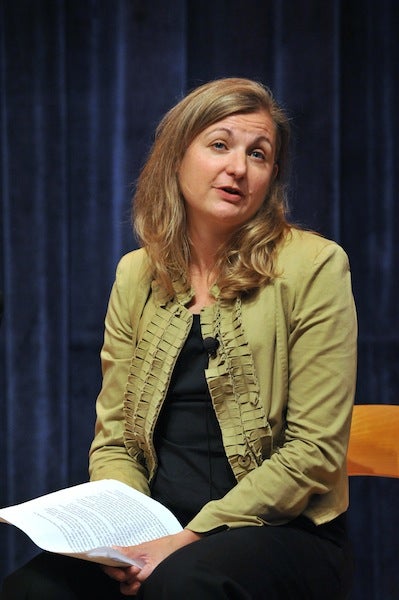KI Research Director Jennifer Luff Discusses New Book
Posted in Events Our Staff | Tagged Jennifer Luff
On September 28, 2012, the Kalmanovitz Initiative hosted a book discussion featuring KI research director Jennifer Luff, author of Commonsense Anticommunism: Labor and Civil Liberties between the World Wars. Published in May 2012, Commonsense Anticommunism is an account of the American Federation of Labor’s post-WWI efforts to combat communism while trying to simultaneously defend workers’ civil liberties and right to organize.
The AFL’s two-front war was, Luff argued, a difficult and ultimately impossible balancing act to pull off. By the 1940’s a red scare was seizing hold of nation’s politics in ways that damaged not only communists but the AFL. What happened during these years, Luff suggests, helps us understand some of the problems that the labor movement faces today and it also sheds light on an unappreciated phenomenon: the persistence of a powerful strand of working-class conservatism in the United States.
In his introduction to the event, KI executive director Joseph A. McCartin credited Luff’s “intellectual courage” in bringing a fresh perspective to the frequently controversial study of communism in America.
In her talk, Luff described how this project emerged from her own brushes with working-class conservatism as a union organizer and from some fortuitous discoveries she made in the archives. Among her most surprising discoveries, she explained, was that FBI director J. Edgar Hoover, a man whose name had become synonymous with McCarthyism and FBI overreach during the post-World War II red scare, was reluctant to pursue communists within the labor movement before the war. As AFL officials grew increasingly concerned about the growth of communist influence in the labor movement, it was they who continuously prodded Hoover to deal with what they saw as a communist threat. Hoover, in many instances, was not nearly as vigilant as the AFL leaders believed he ought to have been.
Luff’s insights will prompt a rethinking of labor’s role in anticommunism and of the nature of pre-World War II labor anti-communism, predicted commentator Eric Arnesen, Professor of History at the George Washington University. Arnesen described Luff’s work as not only an original contribution to the historical conversation, but also as a good read in its own right.
Arnesen pointed out that Luff’s work restores labor’s place in anticommunism. He noted that little else has been written about the role of AFL conservatives, due to the tendency of historians to gravitate towards the more reform-oriented CIO. Luff’s work, then, challenges both revisionist and orthodox historians. In his opinion, her work’s refreshing tone and its rejection of caricature created a judicious, balanced, and nuanced narrative.
Luff and Arnesen’s presentations were followed by a lively discussion with attendees, including scholars, activists, labor movement veterans, and students.

